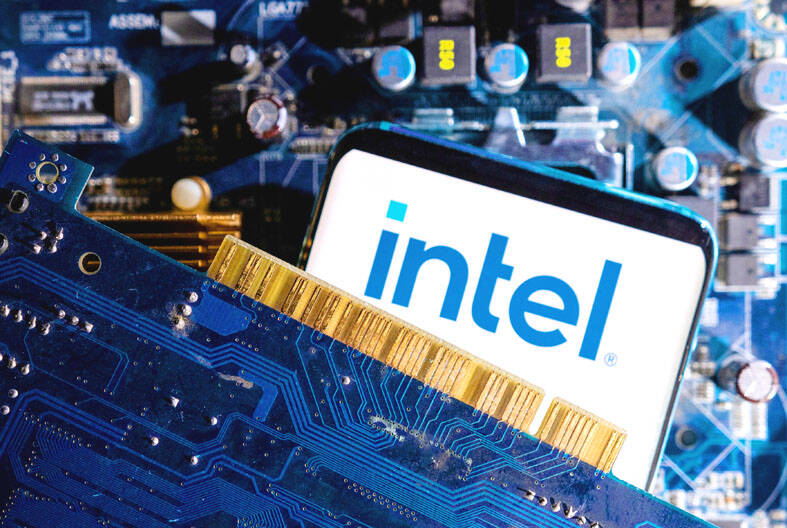The US government plans to reduce Intel Corp’s preliminary US$8.5 billion federal chips grant to less than US$8 billion, the New York Times reported on Sunday, citing unnamed sources.
The change took into account a US$3 billion contract Intel had been offered to make chips for the Pentagon, the sources said.
This spring US President Joe Biden’s administration said it would award Intel nearly US$20 billion in grants and loans, supercharging the company’s domestic semiconductor chip output and marking the US government’s largest outlay to subsidize leading-edge chip production.

Photo:Reuters
The US announced a preliminary agreement for US$8.5 billion in grants and up to US$11 billion in loans for Intel in Arizona, with some of the funding to be used to build two new factories and modernize an existing one.
The outlay was part of the 2022 CHIPS and Science Act, a bid to boost domestic semiconductor output with US$52.7 billion in funding, including US$39 billion in subsidies for semiconductor production and US$11 billion for research and development.
On Nov. 15, the US Department of Commerce announced it has finalized a US$6.6 billion government subsidy for Taiwan Semiconductor Manufacturing Co’s (TSMC, 台積電) US unit for semiconductor production in Phoenix, Arizona.
The TSMC award also includes up to US$5 billion in low-cost government loans.
In addition to TSMC, the commerce department on Wednesday last week said it has finalized a US$1.5 billion government subsidy for GlobalFoundries Inc for its production expansion in Malta, New York and Vermont.
The department has also allocated US$36 billion for chips projects including US$6.4 billion for Samsung Electronics Co and US$6.1 billion for Micron Technology Inc.

‘SWASTICAR’: Tesla CEO Elon Musk’s close association with Donald Trump has prompted opponents to brand him a ‘Nazi’ and resulted in a dramatic drop in sales Demonstrators descended on Tesla Inc dealerships across the US, and in Europe and Canada on Saturday to protest company chief Elon Musk, who has amassed extraordinary power as a top adviser to US President Donald Trump. Waving signs with messages such as “Musk is stealing our money” and “Reclaim our country,” the protests largely took place peacefully following fiery episodes of vandalism on Tesla vehicles, dealerships and other facilities in recent weeks that US officials have denounced as terrorism. Hundreds rallied on Saturday outside the Tesla dealership in Manhattan. Some blasted Musk, the world’s richest man, while others demanded the shuttering of his

ADVERSARIES: The new list includes 11 entities in China and one in Taiwan, which is a local branch of Chinese cloud computing firm Inspur Group The US added dozens of entities to a trade blacklist on Tuesday, the US Department of Commerce said, in part to disrupt Beijing’s artificial intelligence (AI) and advanced computing capabilities. The action affects 80 entities from countries including China, the United Arab Emirates and Iran, with the commerce department citing their “activities contrary to US national security and foreign policy.” Those added to the “entity list” are restricted from obtaining US items and technologies without government authorization. “We will not allow adversaries to exploit American technology to bolster their own militaries and threaten American lives,” US Secretary of Commerce Howard Lutnick said. The entities

Minister of Finance Chuang Tsui-yun (莊翠雲) yesterday told lawmakers that she “would not speculate,” but a “response plan” has been prepared in case Taiwan is targeted by US President Donald Trump’s reciprocal tariffs, which are to be announced on Wednesday next week. The Trump administration, including US Secretary of the Treasury Scott Bessent, has said that much of the proposed reciprocal tariffs would focus on the 15 countries that have the highest trade surpluses with the US. Bessent has referred to those countries as the “dirty 15,” but has not named them. Last year, Taiwan’s US$73.9 billion trade surplus with the US

Prices of gasoline and diesel products at domestic gas stations are to fall NT$0.2 and NT$0.1 per liter respectively this week, even though international crude oil prices rose last week, CPC Corp, Taiwan (台灣中油) and Formosa Petrochemical Corp (台塑石化) said yesterday. International crude oil prices continued rising last week, as the US Energy Information Administration reported a larger-than-expected drop in US commercial crude oil inventories, CPC said in a statement. Based on the company’s floating oil price formula, the cost of crude oil rose 2.38 percent last week from a week earlier, it said. News that US President Donald Trump plans a “secondary